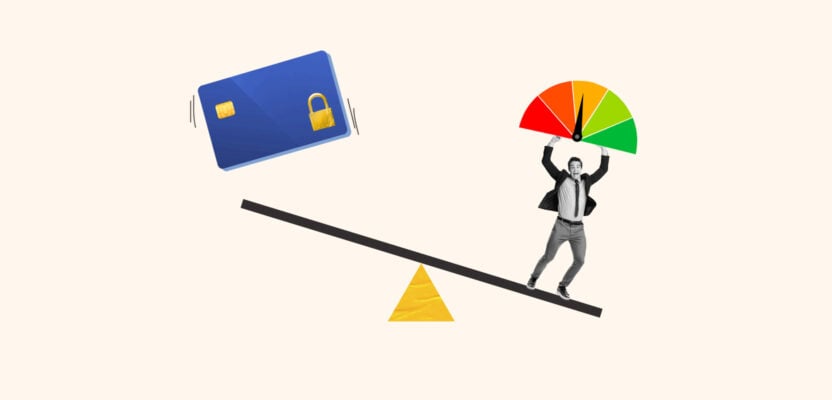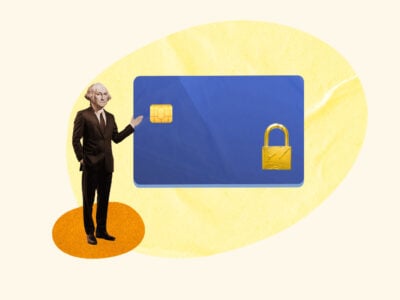If you’ve been researching ways to improve your credit score, then you’ve no doubt heard about secured credit cards. They’re some of the most popular credit-building tools out there, and for good reason—they’re simple to use and very easy to get.
However, before you rush in, it’s worth thinking about whether getting a secured card is worth the time, effort, and money involved. How much will a secured credit card really help your credit score?
Table of Contents
Will a secured card really raise your credit score?
Yes, a secured card can raise your credit score, as long as you use it responsibly. We’ll explain what “responsible use” means in detail later, but in general, opening any credit card and using it in moderation is good for your credit.
However, you may see your credit score drop slightly when you first open the card due to the hard inquiry that will get triggered during the application process. Hard inquiries are credit checks that lenders usually conduct when you apply for credit, and they temporarily lower your score by around 5 points.
Also, bear in mind that simply applying for a credit card won’t raise your score. You’ll need to actually open a secured credit card account for it to build your credit.
How many points does a secured credit card give you?
It’s impossible to predict the exact number of points that a secured credit card will add to your credit score. The same is true for just about any credit action.
After a few months of using your card, you could gain as little as 5 points or as many as 100. It all comes down to your credit profile and how well you manage your credit card account.
What determines the effects of a secured credit card?
Because of how credit scores are calculated, the score impact of different credit actions varies from person to person. The number of points you’ll gain depends on several factors:
- How long you’ve been using credit: If you have no credit score and you’re building credit from scratch, then a secured credit card will do a lot more for you than someone who already has a substantial credit profile.
- Your starting credit score: Similarly, if you have a bad credit score, you may be able to make bigger gains than someone who already has an excellent credit score. Fixing your credit can often be done pretty quickly, but after you reach a certain level, you’ll hit the point of diminishing returns.
- Your credit card limit: Having a lot of available credit that you’re not using will improve your credit score. This means that a secured card with a higher credit limit will benefit your score more than one with a low limit (as long as the higher limit doesn’t tempt you to overspend).
- How long you’ve had the account: Your credit score will improve the longer you’ve had your secured credit card. This is because it’ll increase the length of your credit history, which is one of the factors that affect your credit score.
It’s possible that you won’t see any score change at all when you first get a secured card (in fact, as mentioned, it’s more likely that initially your score will take a slight dip). However, as long as you keep the card in good standing, it will build up your credit over time.
How fast can a secured credit card build credit?
After you open a secured credit card, it’ll probably take around one month for the account to be added to your credit report. This is because most credit card companies only report information to the credit bureaus once every 30–45 days. 1
Once the credit card is added to your credit file, it’ll immediately begin contributing to your credit. However, it’ll probably take a few months before you notice substantial improvement in your score.
This is because it takes time to establish a positive payment history and allow your credit card account to age.
How to raise your credit score with a secured card
To ensure that your secured credit card increases your credit score and doesn’t cause it to drop, follow these steps:
1. Choose a good secured credit card for building credit
Not all secured credit cards have the same features and benefits. Some place more emphasis on rewards or low credit card annual fees, whereas others are designed especially for people who want to raise their credit score.
To ensure that your secured credit card raises your credit score by the maximum number of points, look for these features when shopping around:
- High credit limit
- Reports to all three credit bureaus
- Offers the opportunity to increase your credit limit later
You should also take into account your budget. Unlike unsecured credit cards, secured credit cards require a security deposit, meaning you’ll need to pay money upfront.
If you use all the money you have for the security deposit on a credit card, then you run the risk of not being able to afford your first couple of credit card bills, which defeats the purpose of opening the card.
Start by comparing offers and checking out the best secured credit cards on the market right now:
2. Make sure to always pay all your bills on time
Paying all your credit card bills on time is the single most important thing you can do if you’re trying to use a secured credit card to increase your credit score. This is because your payment history is weighted more heavily than any other factor in the calculation of your score.
Here are a couple tips that’ll help you maintain a strong payment history on your secured card:
- Catch up on missed payments as soon as possible: Late payments aren’t usually reported until they’re at least 30 days past due, so if you’re only a few days late paying your credit card bill, there’s a chance you can avoid having a late payment added to your credit report if you send in the payment ASAP.
- Contact your creditor if you’re struggling: If you think you won’t be able to afford the minimum payment on your secured credit card, tell your credit card company as soon as possible. They may be able to reduce your minimum payment or defer your payments.
3. Keep your spending low
One of the main ways that a secured credit card can improve your credit score is by increasing the amount of available credit you have. By default, getting a new line of revolving credit (i.e., a credit card) improves your credit score by decreasing your credit utilization rate, which is the amount of credit you’re using.
Keeping your spending to a minimum on your secured card will ensure that you have plenty of available credit and that your credit utilization ratio is low at all times.
4. Ask for a credit limit increase
Another way to lower your credit utilization rate is to increase your credit card limit. Secured credit cards tend to have very low credit limits compared with unsecured cards, but you may be able to get a credit limit increase if you’ve had a secured credit card for a few months and you haven’t missed any payments.
Some credit card companies will increase your credit limit automatically, but if they don’t, consider asking them for a credit limit increase to give your credit score a boost.
Once you’ve had your secured credit card for a long time and your credit score has improved, you can also ask your card issuer about the possibility of upgrading to an unsecured credit card account. This additional increase in your available credit will further raise your credit score.






